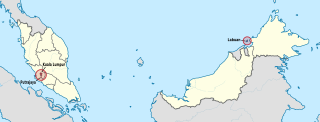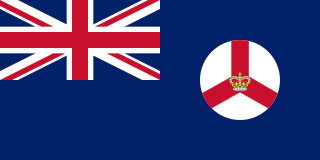
Réunion is an overseas département of France.

Bermuda is the oldest British Overseas Territory, and the oldest self-governing British Overseas Territory, and has a great degree of internal autonomy through authority and roles of governance delegated to it by the national Government. Its parliament held its first session in 1620, making it the third-oldest continuous parliament in the world. As part of the British realm, King Charles III is head of state and is represented in Bermuda by a Governor, whom he appoints on the advice of the British Government. The Governor has special responsibilities in four areas: external affairs, defence, internal security, and policing.

The Federal Territories (FT), in Malaysia comprise three territories—Kuala Lumpur, Labuan, and Putrajaya—governed directly by the Federal Government of Malaysia. Kuala Lumpur is the national capital of Malaysia, Putrajaya is the administrative capital, and Labuan is an offshore international financial centre. Kuala Lumpur and Putrajaya are enclaves in the state of Selangor. Labuan is an island off the coast of Sabah.

General elections were held in Malaysia on Sunday, 21 March 2004. Voting took place in all 219 parliamentary constituencies, each electing one Member of Parliament to the Dewan Rakyat, the dominant house of Parliament. They were the first elections for Abdullah Ahmad Badawi as Prime Minister following his appointment in 2003. State elections also took place in 505 state constituencies in twelve of the thirteen states on the same day, which also marked the first time Sabah held its state election parallel with the other states of Peninsular Malaysia.

The 1978 New Zealand general election was a nationwide vote to elect the 39th New Zealand Parliament. It saw the governing National Party, led by Robert Muldoon, retain office, but the opposition Labour Party won the largest share of the vote. Reorganisation of the enrolment system caused major problems with the electoral rolls, which left a legacy of unreliable information about voting levels in this election.

The New Zealand parliamentary electoral system has been based on the principle of mixed-member proportional (MMP) since the 1996 election. MMP was introduced following a referendum in 1993. It replaced the first-past-the-post (FPP) system New Zealand had previously used for most of its history. Under the MMP system, New Zealanders have two secret ballot votes to elect members of Parliament (MPs). The first vote is for a candidate from an electorate, a geographic electoral district. The second is the party vote for the political party the voter wants to form the government.

The Parliament of the Cook Islands is the legislature of the Cook Islands. Originally established under New Zealand administration, it became the national legislature upon independence in 1965.

The Colony of Singapore was a Crown colony of the United Kingdom that encompassed what is modern-day Singapore from 1946 to 1958. During this period, Christmas Island, the Cocos (Keeling) Islands, and Labuan were also administered from Singapore. Singapore had previously been established as a British colony since 1824, and had been governed as part of the Straits Settlements since 1826. The colony was created when the Straits Settlements was dissolved shortly after the Japanese occupation of Singapore ended in 1945. The power of the British Government was vested in the governor of Singapore. The colony eventually gained partial internal self-governance in 1955, and lasted until the establishment of the State of Singapore in 1958, with full internal self-governance granted in 1959.

General elections were held in Samoa on 2 March 2001 to determine the composition of the 13th Parliament. Four parties contested the election, including the ruling Human Rights Protection Party (HRPP) and the main opposition Samoan National Development Party (SNDP). The HRPP was led into the election by Prime Minister Tuilaʻepa Saʻilele Malielegaoi, who succeeded Tofilau Eti Alesana in 1998 following his resignation.

General elections were held in the Cook Islands on 30 March 1983. The result was a victory for the Cook Islands Party (CIP) of Geoffrey Henry, who became prime minister. However, the CIP lost their majority by the end of July, eventually resulting in Parliament being dissolved and new elections called in November 1983.

General elections were held in the Cook Islands on 30 March 1978 to elect members of the Legislative Assembly. The result was a victory for the Cook Islands Party (CIP) of Premier Albert Henry, which won 15 of the 22 seats. The Democratic Party won the remaining seven seats.
Parliamentary elections were held in Tuvalu on 16 September 2010. Voters elected fifteen members of the Parliament to a four-year term. All candidates were independents, as there are no political parties in the country. Ten out of the fifteen incumbent members were re-elected. The remaining five incumbents, including Deputy Prime Minister Tavau Teii, did not retain their seats. The incumbent Prime Minister, Apisai Ielemia, retained his seat in Vaitupu constituency. On 29 September, Maatia Toafa from Nanumea won eight of the fifteen votes to become Prime Minister.

General elections were held in the Cook Islands on 17 November 2010 in order to elect 24 MPs to the Cook Islands Parliament. The elections were won by the Cook Islands Party, which won 16 of the 24 seats. Voter turnout was 78%.
There are five types of elections in the United Kingdom: elections to the House of Commons of the United Kingdom, elections to devolved parliaments and assemblies, local elections, mayoral elections, and Police and Crime Commissioner elections. Within each of those categories, there may also be by-elections. Elections are held on Election Day, which is conventionally a Thursday, and under the provisions of the Dissolution and Calling of Parliament Act 2022 the timing of general elections can be held at the discretion of the prime minister during any five-year period. All other types of elections are held after fixed periods, though early elections to the devolved assemblies and parliaments can occur in certain situations. The five electoral systems used are: the single member plurality system (first-past-the-post), the multi-member plurality, the single transferable vote, the additional member system, and the supplementary vote.

Overseas France consists of 13 French territories outside Europe, mostly the remnants of the French colonial empire that remained a part of the French state under various statuses after decolonisation. Most are part of the European Union.
An overseas constituency or overseas electoral district is any electoral district located outside of a nation-state's borders but which is recognized by the state's government as a district for the representation of its expatriate residents who live within the territory of another nation-state. Such constituencies are often organized in order to engage expatriate or diaspora voters who retain their citizenship.

General elections were held in the Cook Islands on 9 July 2014, determining the membership of the 16th Cook Islands Parliament.

The 2017 Queensland state election was held on 25 November 2017 to elect all 93 members of the Legislative Assembly of Queensland, the unicameral Parliament of Queensland.

General elections were held in the Cook Islands on 14 June 2018 to elect the 24 members of the 17th Cook Islands Parliament.
The Overseas seat was a Cook Islands electoral division returning one member to the Cook Islands Parliament. It was abolished in 2003.













